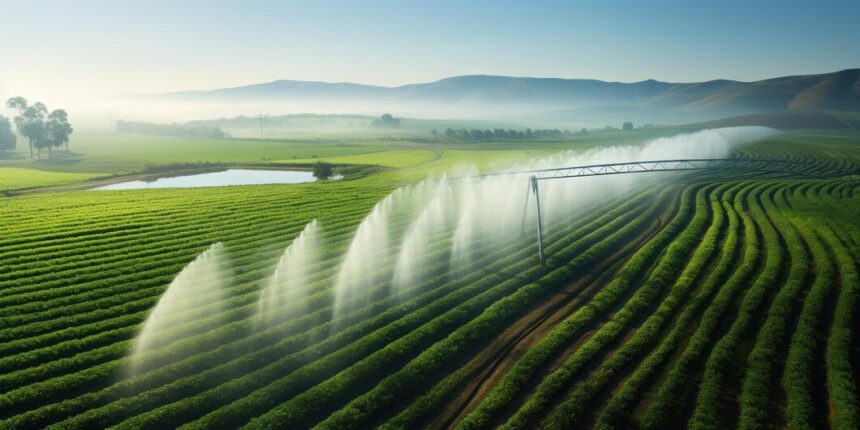Irrigation plays a crucial role in South Africa’s agricultural sector, providing water to crops and ensuring food security in a country with diverse climatic conditions. However, water scarcity and increasing demand pose significant challenges to sustainable irrigation practices. Enhancing irrigation efficiency is essential for maximizing water use and minimizing environmental impact. In this article, we’ll explore ten ways to improve irrigation efficiency in South Africa and ensure the sustainability of agricultural water resources.
1. Adopt Drip Irrigation Systems
Drip irrigation delivers water directly to the roots of plants, minimizing water loss due to evaporation and runoff. By precisely targeting water where it is needed, drip irrigation systems can significantly reduce water usage while promoting healthy plant growth. South African farmers can benefit from adopting drip irrigation technology, particularly in areas with limited water availability.
2. Implement Soil Moisture Monitoring
Soil moisture monitoring allows farmers to assess the water content of the soil and determine when irrigation is needed. By using sensors or probes to measure soil moisture levels, farmers can avoid overwatering and ensure that crops receive the right amount of water at the right time. Implementing soil moisture monitoring systems improves irrigation efficiency and reduces water wastage.
3. Embrace Precision Irrigation Techniques
Precision irrigation techniques, such as variable rate irrigation (VRI) and precision application systems, enable farmers to adjust water application rates based on specific crop and soil requirements. By matching irrigation rates to field variability, precision irrigation techniques optimize water use efficiency and minimize water loss. South African farmers can leverage precision irrigation technology to maximize yields while conserving water resources.
4. Mulching and Cover Cropping
Mulching and cover cropping help retain soil moisture and reduce evaporation, especially in hot and arid regions. By covering the soil surface with organic materials or cover crops, farmers can prevent water loss, suppress weed growth, and improve soil structure. Mulching and cover cropping enhance soil moisture retention and reduce the need for frequent irrigation, promoting water conservation in South African agriculture.
5. Optimize Irrigation Scheduling
Effective irrigation scheduling involves timing irrigation events to coincide with plant water demand and soil moisture levels. By using weather data, soil moisture sensors, and crop water requirements, farmers can develop optimized irrigation schedules that minimize water waste and maximize crop yields. Implementing efficient irrigation scheduling practices improves water use efficiency and reduces irrigation costs.
6. Retrofit Irrigation Infrastructure
Upgrading and retrofitting existing irrigation infrastructure can improve system efficiency and reduce water losses. By replacing outdated equipment, such as pumps, pipes, and sprinklers, with more efficient technologies, farmers can minimize water leakage and improve water distribution uniformity. Retrofitting irrigation infrastructure enhances system performance and reduces water waste in South African agriculture.
7. Practice Crop Rotation and Selection
Crop rotation and selection strategies can help optimize water use and soil moisture retention. By rotating crops with different water requirements and planting drought-tolerant varieties, farmers can minimize irrigation needs and adapt to changing climatic conditions. Crop rotation and selection promote sustainable water management practices and enhance irrigation efficiency in South Africa.
8. Implement Rainwater Harvesting
Rainwater harvesting systems capture and store rainwater for irrigation purposes, reducing reliance on groundwater and surface water sources. By collecting rainwater from rooftops, catchments, and storage tanks, farmers can supplement irrigation water supplies during dry periods and mitigate the impacts of water scarcity. Implementing rainwater harvesting technology enhances water security and resilience in South African agriculture.
9. Improve Irrigation Canal Maintenance
Proper maintenance of irrigation canals and channels is essential for ensuring efficient water delivery to fields. By clearing obstructions, repairing leaks, and optimizing water flow, farmers can minimize water losses and improve irrigation system performance. Regular maintenance of irrigation infrastructure enhances water delivery efficiency and reduces wastage in South Africa’s irrigation networks.
10. Educate and Train Farmers
Education and training programs play a vital role in promoting water-saving practices and improving irrigation efficiency among South African farmers. By providing access to knowledge, resources, and technical assistance, extension services can empower farmers to adopt sustainable irrigation techniques and optimize water use. Educating farmers about water conservation strategies fosters a culture of resource stewardship and enhances irrigation efficiency nationwide.
Enhancing irrigation efficiency is essential for sustainable agriculture and water resource management in South Africa. By adopting technologies and practices such as drip irrigation, soil moisture monitoring, precision irrigation, and rainwater harvesting, farmers can maximize water use efficiency and minimize environmental impact. Implementing these strategies requires collaboration among stakeholders, investment in infrastructure, and support for education and training initiatives. By prioritizing irrigation efficiency, South Africa can ensure the long-term sustainability of its agricultural sector while preserving precious water resources for future generations.
Join 'Farmers Mag' WhatsApp Channel
Get the latest Farming news and tips delivered straight to your WhatsApp
CLICK HERE TO JOIN






